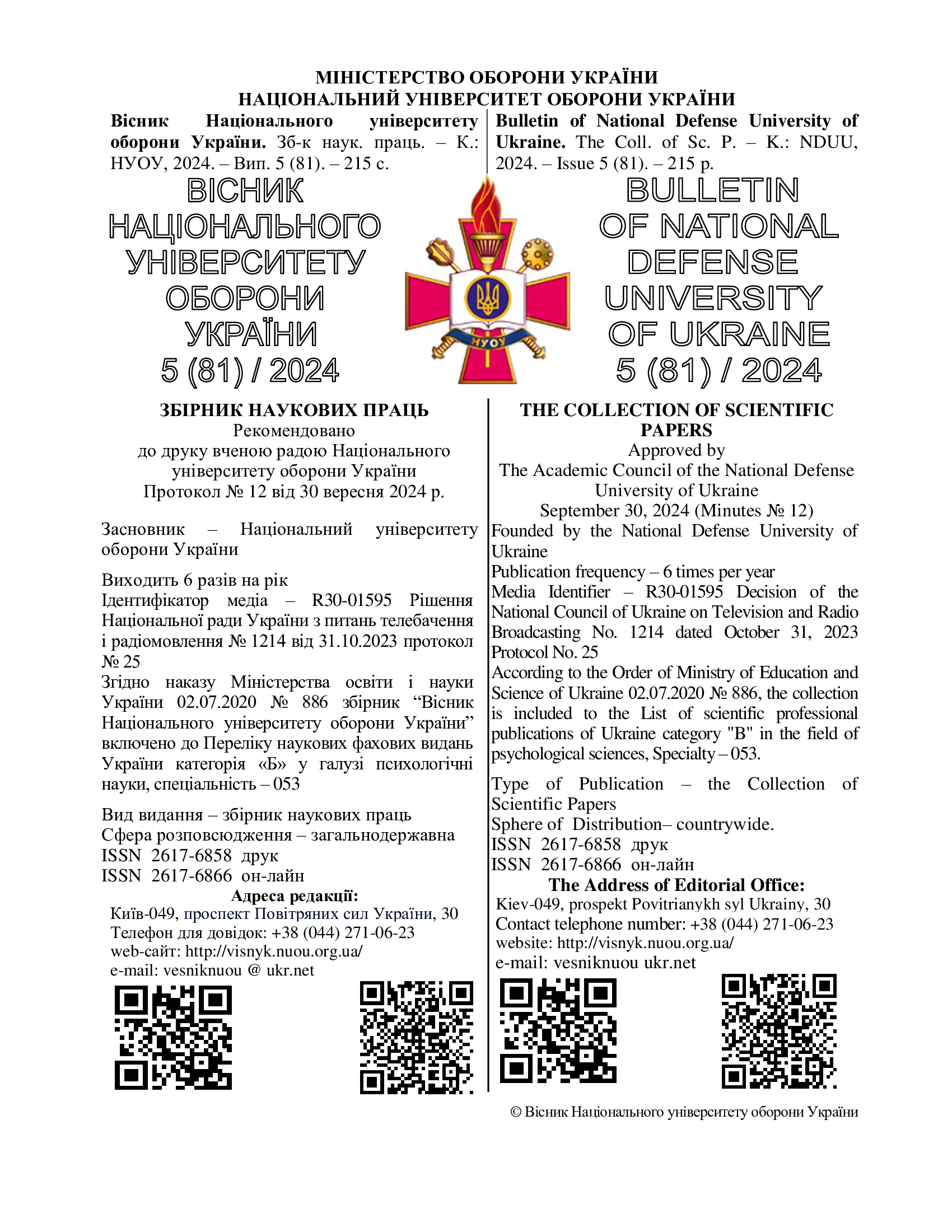ЧАТ GPT ЯК ЗАСІБ ПОКРАЩЕННЯ ДОСТУПУ ДО ПСИХОЛОГІЧНОЇ ПІДТРИМКИ УКРАЇНЦІВ В УМОВАХ ВІЙНИ
DOI:
https://doi.org/10.33099/2617-6858-2024-81-5-61-68Ключові слова:
психологічна підтримка, доступність психологічної допомоги, нетрадиційні методи психологічної допомоги, штучний інтелект, чат GPT, війна в Україні.Анотація
Статтю присвячено проблемі застосування віртуальних способів психологічної підтримки українців. Обґрунтовано роль чату GPT як ресурсу підвищення доступності психологічної допомоги населенню небезпечних районів в умовах війни. Схарактеризовано основні переваги і недоліки його використання. Проілюстровано застосування чатом GPT інструментів КПТ з метою зниження рівня тривожності українців.
Завантаження
Посилання
Voitko, V. V., Avramenko, O. V., Hordash, A. R., & Petruk, V. V. (2023). Osoblyvosti rozrobky prohramnoho zastosunku dlia psykholohichnoi pidtrymky. [Peculiarities of developing a software application for psychological support]. Zbirnyk materialiv Mizhnarodnoi naukovo-praktychnoi Internet-konferentsii «Elektronni informatsiini resursy: stvorennia, vykorystannia, dostup», 20-21 lystopada. – Proceedings of the International Scientific and Practical Internet Conference "Electronic Information Resources: Creation, Use, Access", November 20-21, Sumy/Vinnytsia. 56-58. URL: http://surl.li/zvyzdd (in Ukrainian).
Ielovets, O., Arzubov, M., Chelak, V., Pidbutska, N., & Panfilov, Yu. (2024). Mental health support application based on aritificial intelligence. [Mental health support application based on artificial intelligence]. Teoriia i praktyka upravlinnia sotsialnymy systemamy – Theory and practice of social systems management, 1, 28-49. doi: https://doi.org/10.20998/2078-7782.2024.1.03 (in Ukrainian).
Alharthi, R., Guthier, B., & El Saddik, A. (2018). Recognizing human needs during critical events using machine learning powered psychology-based framework. IEEE Access, 6, 58737-58753. DOI: 10.1109/ACCESS.2018.2874032
Al-Imam, A., Motyka, M. A., & Jędrzejko, M. Z. (2020). Conflicting opinions in connection with digital superintelligence. IAES International Journal of Artificial Intelligence, 9(2), 336. DOI:10.11591/ijai.v9.i2.pp336-348
Bickmore, T. W., & Picard, R. W. (2005). Establishing and maintaining long-term human-computer relationships. ACM Transactions on Computer-Human Interaction, 12(2), 293-327. doi: https://doi.org/10.1145/1067860.1067867
Biliavska, V., Castanho, R. A., & Vulevic, A. (2022). Analysis of the impact of artificial intelligence in enhancing the human resource practices. J. Intell. Manag. Decis, 1, 128-136. https://doi.org/10.56578/jimd010206
Binz, M., & Schulz, E. (2023). Using cognitive psychology to understand GPT-3. Proceedings of the National Academy of Sciences, 120(6), doi: https://doi.org/10.1073/pnas.2218523120.
Dhingra, S., Singh, M., Vaisakh, S. B., Malviya, N., & Gill, S. S. (2023). Mind meets machine: Unravelling gpt-4’s cognitive psychology. BenchCouncil Transactions on Benchmarks, Standards and Evaluations, 3(3), 100139. doi: https://doi.org/10.48550/arXiv.2303.11436
Fitzpatrick, K. K., Darcy, A., & Vierhile, M. (2017). Delivering cognitive behavior therapy to young adults with symptoms of depression and anxiety using a fully automated conversational agent (Woebot): A randomized controlled trial. JMIR Mental Health, 4(2). doi: https://doi.org/10.2196/mental.7785
Gado, S., Kempen, R., Lingelbach, K., & Bipp, T. (2022). Artificial intelligence in psychology: How can we enable psychology students to accept and use artificial intelligence?. Psychology Learning & Teaching, 21(1), 37-56. https://doi.org/10.1177/14757257211037
Hoermann, S., McCabe, K. L., Milne, D. N., & Calvo, R. A. (2017). Application of synchronous text-based dialogue systems in mental health interventions: Systematic review. Journal of Medical Internet Research, 19(8), e267. doi: https://doi.org/10.2196/jmir.7023
Inaba, M., Ukiyo, M., & Takamizo, K. (2024). Can large language models be used to provide psychological counselling? an analysis of gpt-4-generated responses using role-play dialogues. arXiv preprint arXiv:2402.12738. doi: https://doi.org/10.48550/arXiv.2402.12738
Inkster, B., Sarda, S., & Subramanian, V. (2018). An empathy-driven, conversational artificial intelligence agent (Wysa) for digital mental well-being: Real-world data evaluation mixed-methods study. JMIR mHealth and uHealth, 6(11), doi: https://doi.org/10.2196/12106
Jensen, B. M., Whyte, C., & Cuomo, S. (2020). Algorithms at war: the promise, peril, and limits of artificial intelligence. International Studies Review, 22(3), 526-550. DOI:10.1093/isr/viz025
Kambur, E., & Akar, C. (2022). Human resource developments with the touch of artificial intelligence: a scale development study. International Journal of Manpower, 43(1), 168-205. DOI:10.1108/IJM-04-2021-0216
Kostenko, O. M., Bieliakov, K. I., Tykhomyrov, O. O., & Aristova, I. V. (2023). "Legal personality" of artificial intelligence: methodological problems of scientific reasoning by Ukrainian and EU experts. AI & SOCIETY, 1-11. https://doi.org/10.1007/s00146-023-01641-0.
Kshetri, N. (2021). Evolving uses of artificial intelligence in human resource management in emerging economies in the global South: some preliminary evidence. Management Research Review, 44(7), 970-990. DOI:10.1108/mrr-03-2020-0168
Lu, H., Niu, X., Wang, J., Wang, Y., Hu, Q., Tang, J., ... & Shan, S. (2024). Gpt as psychologist? preliminary evaluations for gpt-4v on visual affective computing. In Proceedings of the IEEE/CVF Conference on Computer Vision and Pattern Recognition (pp. 322-331). doi: https://doi.org/10.48550/arXiv.2403.05916
Luxton, D. D., McCann, R. A., Bush, N. E., Mishkind, M. C., & Reger, G. M. (2011). mHealth for mental health: Integrating smartphone technology in behavioral healthcare. Professional Psychology: Research and Practice, 42(6), 505-512. doi: https://doi.org/10.1037/a0024485
Miner, A. S., Milstein, A., Schueller, S., Hegde, R., Mangurian, C., & Linos, E. (2016). Smartphone-based conversational agents and responses to questions about mental health, interpersonal violence, and physical health. JAMA Internal Medicine, 176(5), 619-625. doi: https://doi.org/10.1001/jamainternmed.2016.0400
Murthy, R. S., & Lakshminarayana, R. (2006). Mental health consequences of war: a brief review of research findings. World Psychiatry, 5(1), 25-30. doi: https://doi.org/10.1002/j.2051-5545.2006.tb00079.x
Sanyaolu, E., & Atsaboghena, R. (2022). Role of Artificial Intelligence in Human Resource Management: Overview of its benefits and challenges. ResearchGate, (December), 1-8. DOI:10.13140/RG.2.2.22297.29283
Somasundaram, D. (2007). Collective trauma in northern Sri Lanka: a qualitative psychosocial-ecological study. International Journal of Mental Health Systems, 1(1), 5. doi: https://doi.org/10.1186/1752-4458-1-5
Strohmeier, S., & Piazza, F. (2015). Artificial intelligence techniques in human resource management – a conceptual exploration. Intelligent Techniques in Engineering Management: Theory and Applications, 149-172. DOI:10.1007/978-3-319-17906-3_7
Uludag, K. (2023). The use of AI-supported Chatbot in Psychology. Available at SSRN 4331367. http://dx.doi.org/10.2139/ssrn.4331367
##submission.downloads##
Опубліковано
Як цитувати
Номер
Розділ
Ліцензія
Авторське право (c) 2024 Вісник Національного університету оборони України

Ця робота ліцензується відповідно до Creative Commons Attribution-NonCommercial-ShareAlike 4.0 International License.





